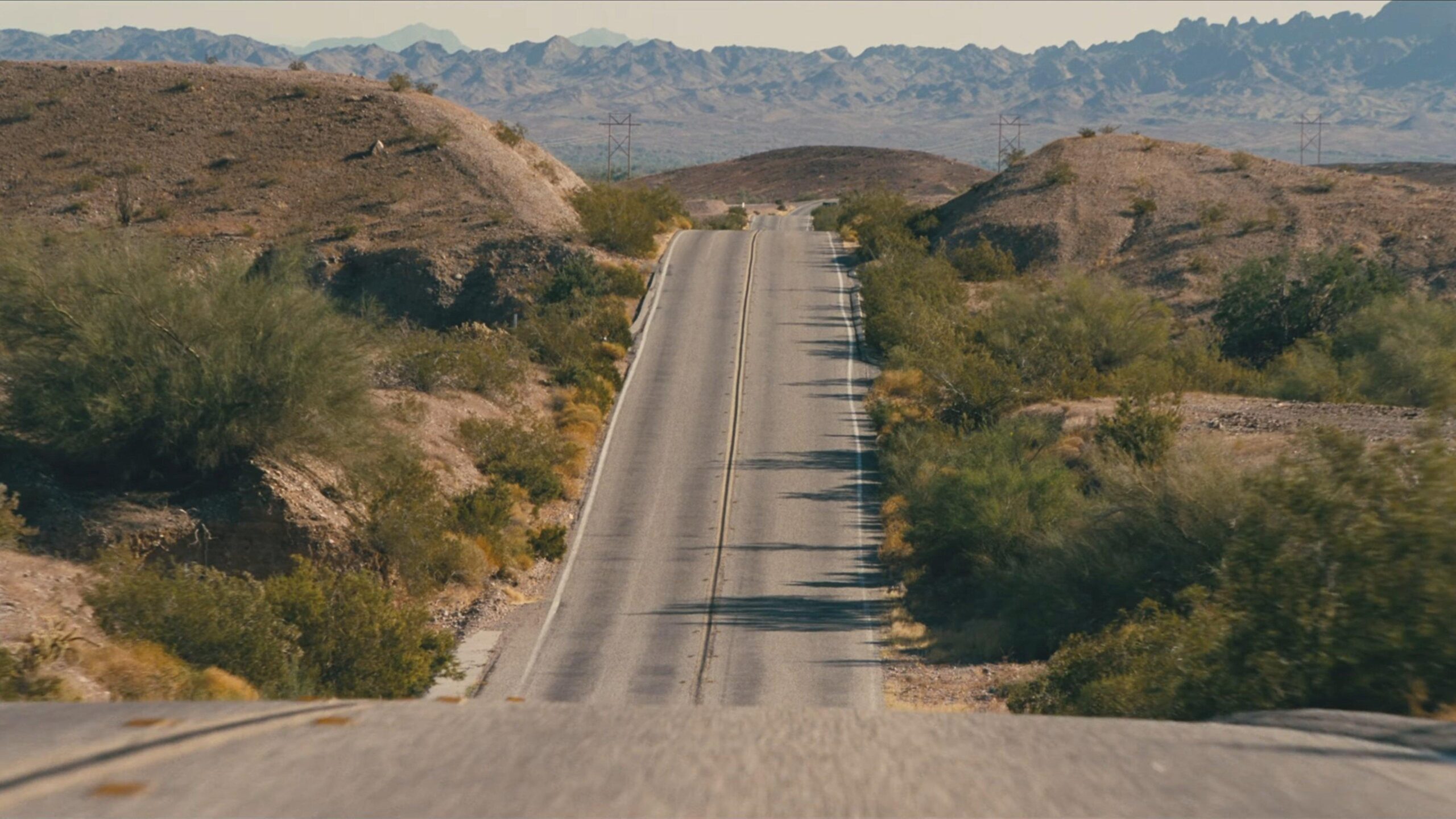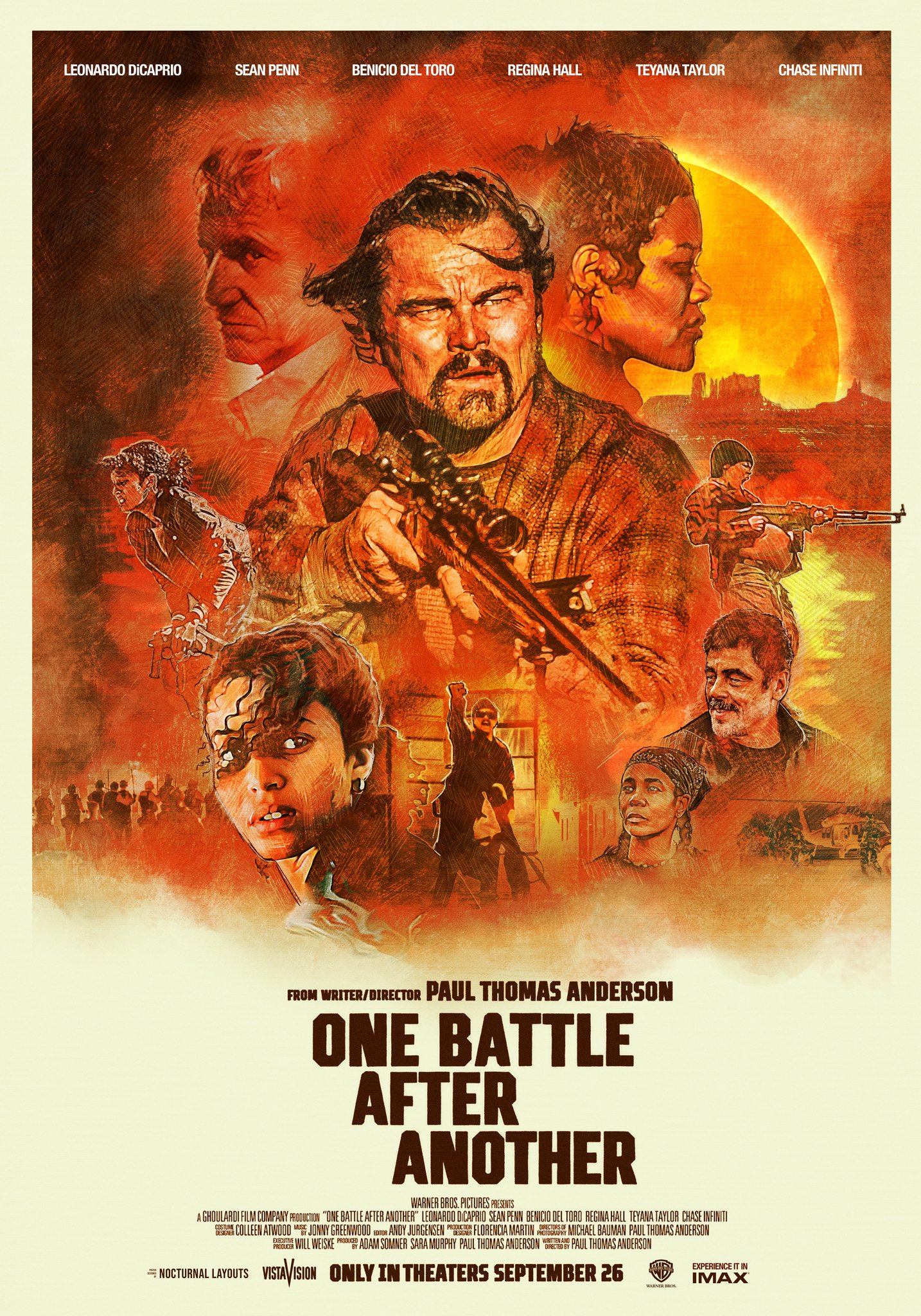
One Battle After Another
I used to live on Otay Mesa just a few miles away from where the events that open One Battle After Another (2025) are set. We got married in those coastal, desert mountains. My wife changed her surname at the border crossing DMV. We bought our a double-nest hammock at the REI in the Otay Mesa outdoor mall using gift cards we got at our wedding.
Less than a year before that, I had camped alone in Anza Borrego Desert State Park, where parts of One Battle After Another were filmed, and realized if I never got married I’d be okay. I wouldn’t know the interlacing knot of matrimony or the pinion of parenthood, but I would, I realized sitting there in the desert by a small fire with the ceiling of the celestial cathedral yawning over me, learn deeper things about friendship and spiritual brotherhood than I would otherwise know. Surrendering the customary enclaves of normal family life, I would be presented with freedom, high and heady, expansive, and I would channel that freedom into membership in the global, historic body of the church alongside the pilgrim, the monk, the ascetic. In many ways, my part to play in the mission of God would be simpler absent the complications of familial responsibilities. Paul knew what he was talking about in his letter to the Corinthians. If I don’t get married I’ll be okay, I thought sitting in that desert.
I packed up my campsite the next morning, drove back to Otay Mesa over the wavy highway that is the setting for the climax of One Battle After Another, got ready for a blind date, and met the woman who was, less than a year later, to become my wife. So much for freedom.
(The only time I’ve been back to Anza Borrego since was to meet Jesus—er—Ewan McGregor, Ciarán Hinds, Ty Sheridan, and Chivo on the set of Rodrigo García’s Last Days in the Desert, a story for another time, but I never miss a chance to mention that movie. I wish more people would see it.)
Freedom is very much on the mind of One Battle After Another, PT Anderson’s second adaptation of a Thomas Pynchon novel (Vineland) after his 2014 film Inherent Vice, my favorite PTA film because of its sense of humor, it’s dreamy atmosphere, and it’s score, which is like an intoxicated cousin to Bernard Herrmann’s score for Vertigo, the perfect musical expression of Doc Sportello’s love-lorn, drug-addled angst (Joaquin Phoenix at his funniest).
Anderson’s adaptation of Vineland is loose. The novel is set in the 1980s and is about the war on drugs. Anderson has updated it to a vague present day and made it about the war on immigrants. Racist fascists are racist fascists in both eras and drugged-out paranoia is a motif that always works, so the update isn’t much of a stretch. If you go to the movies to escape from the conflicts in our contemporary moment, of if you think there’s nothing farcical about the primary contestants in the conflicts abounding around us, this probably isn’t the movie for you. That’s not to say this is all buffoonery. There is sincerity in this film, like stars piercing the immutable void. Orient yourself accordingly and PTA will guide you through the darkness. The light might even linger like an afterimage when you reenter the real world.
Like Inherent Vice‘s Doc, Bob (dear Leonardo DiCaprio, heartbreakingly earnest) is drug-addled and love-lorn in One Battle After Another. He is one of those points of light. He’s coping with the loss of his love, their friends, and their mission some sixteen years earlier. He is ineffectual in every moment except the one that matters most. His devotion is exemplary. But this story isn’t really about him. That bit of misdirection in the marketing for One Battle After Another is a masterful bit of carnival barking. Leo is there to create a diversion, just like the character he plays. Step inside PTA’s tent expecting the usual DiCaprio antics and discover so much more.
Freedom is what everyone is fighting for in this film. Bob’s love, Perfidia (Teyana Taylor, a fist meeting its mark like a piston striking a spark plug) is fighting for a revolution, and she guards her freedom to fight that fight at all costs. Her revolution is militant and conspicuously non-lethal. She makes a tragic mistake and uses her power to humiliate someone sexually, thereby stepping out of her idealistic crusade and into the ecosystem of power she is trying to overthrow. As in other PTA movies the sex scenes are suggested but never shown, and they aren’t about sex at all. They are about power. This costs her almost everything. Snatching power, she loses her freedom.
Col. Lockjaw (Sean Penn rocking John Wayne’s limp) learns the hard way that the freedom he desires requires submission to a (comical) power structure, the Christmas Adventurers’ Club. He says he loves, but he doesn’t; he hates, maybe himself most of all, because he’s afraid of his inclinations and how if they are allowed to flower then the whole power structure his life is based on will topple. At first, Col. Lockjaw feels broadly drawn almost to the point of caricature – if not for the subtleties Penn finds in him – but then you meet the people Lockjaw hopes to be friends with, and you realize what he really wants is to be simpler still, the embodiment of a single idea about superiority, a knife in the water able and allowed to do whatever he wants without repercussion: absolute freedom. That sort of freedom doesn’t exist. It’s the lure evil uses to drag you down with it. It doesn’t exist because you never know what’s over the next hill. Time and chance happen to all.
When I sat in the desert staring up at the stars considering the paths of celibacy and family and the amount of freedom involved in both, I knew then that the unmarried life wouldn’t be a life without connection, without responsibility, without conviviality. In fact, I knew then that it would take effort to remain involved in the lives of the people I love and who love me. The monks, the nuns, the ascetics do not lead untethered lives. I was never going to become Catholic, but I would have established an order for my life that was oriented around caring for and being cared for by others. When I packed up and drove out of the desert the next day, I was going to stay with my friends who were doing a church plant on Otay Mesa. I visited them regularly intentionally to help them in their work. I was grateful for their reciprocal care for me as I discerned the course of my life. If I did not end up participating in the sacrament of marriage, I would nevertheless participate in the Communion of the Saints.
Not for nothing, but sixteen years into the story in One Battle After Another, we find that the revolutionaries have organized themselves into both a Latino-led underground railroad like that organized by the Abolitionists and into a convent of machine gun brandishing nuns.
I’m not sure it ever clicks for Bob—nothing is really clicking these days for Bob’s doped-out brain—but we can recognize that the movie’s revolution is really happening amongst the marginalized people, as it always has been. Maybe he knows that his part to play in this whole thing is a small one, at best. (I’m certain PTA and DiCaprio know this.) He does one essential thing – he pursues his daughter, and he is there in the moment she needs him most.
I recognized then, in the desert, and I recognize now that though Jesus does interact with powerful people, he walks with the poor. He lives with the poor. He eats with the poor. And when he hangs out with someone rich, they are poor in spirit. You can be poor in spirit, which, given the privilege I was born into thanks to my race, my gender, my sexuality, my religious upbringing, my nationality, and the moment in history of my life – given all of this, my ambition is to be poor in spirit. It’s the only way I’ll know the kingdom of heaven. I didn’t think then and I don’t think now that it was God’s direction for me to be materially poor. I especially knew then that if God had marriage in mind for me, poverty wouldn’t be in the cards. Not that there aren’t poor families, of course, but they didn’t choose it, and I could only choose it. No, poor in spirit was the best I could pray for, and I pray for it still.
In the end, everyone gets what they deserve in One Battle After Another. Justice is spread across the narrative, maybe not enough to cover every corner, but enough to touch all the principal participants. And like in other PTA films, there’s sprinkling of grace too. Happiness is graced upon the people simply stumbling through, vaguely aware of what’s good, aware enough to not walk down the way that leads to death.

